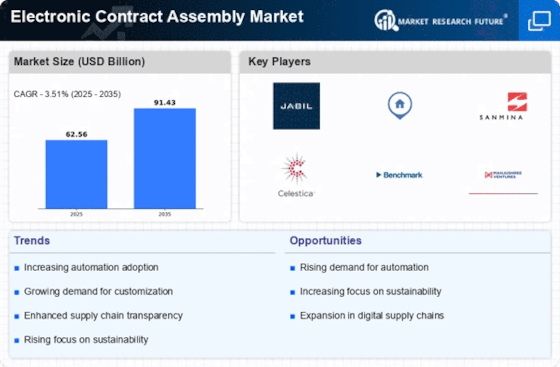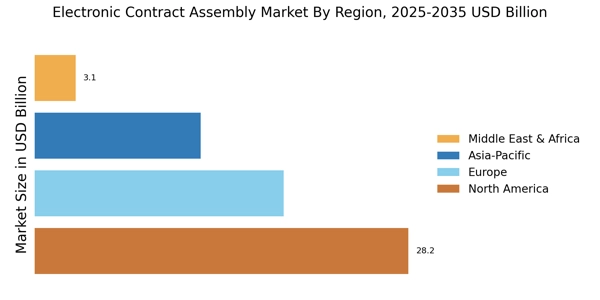Rising Demand for Automation
The Electronic Contract Assembly Market is experiencing a notable surge in demand for automation solutions. As businesses increasingly seek to enhance operational efficiency, the integration of automated systems into contract assembly processes appears to be a key driver. According to recent data, the automation segment is projected to grow at a compound annual growth rate of approximately 10% over the next five years. This trend indicates a shift towards streamlined operations, reducing manual errors and improving turnaround times. Consequently, companies are investing in advanced technologies such as robotics and artificial intelligence to optimize their assembly lines. This growing inclination towards automation not only enhances productivity but also aligns with the broader industry trend of digital transformation, positioning the Electronic Contract Assembly Market for sustained growth.
Emergence of New Market Players
The Electronic Contract Assembly Market is witnessing the emergence of new market players, which is reshaping the competitive landscape. Startups and smaller firms are entering the market with innovative solutions and niche offerings, challenging established companies. This influx of new entrants appears to be driven by advancements in technology and a growing appetite for specialized services. Market data indicates that the number of new companies entering the sector has increased by approximately 25% in recent years. This trend fosters a more competitive environment, encouraging existing players to enhance their service offerings and adopt more customer-centric approaches. As a result, the emergence of new market players is likely to stimulate innovation and drive overall growth within the Electronic Contract Assembly Market.
Regulatory Compliance and Standards
Regulatory compliance is becoming increasingly critical within the Electronic Contract Assembly Market. As governments and regulatory bodies impose stricter standards, companies are compelled to ensure that their assembly processes adhere to these regulations. This focus on compliance is driving investments in technologies and systems that facilitate adherence to industry standards. Industry expert's suggest that compliance-related expenditures are expected to rise by 12% over the next few years, as companies seek to avoid penalties and enhance their reputations. Furthermore, the need for transparency and traceability in assembly processes is likely to become a standard expectation among clients. Consequently, the emphasis on regulatory compliance is anticipated to be a significant driver of growth and transformation within the Electronic Contract Assembly Market.
Increased Focus on Quality Assurance
Quality assurance remains a pivotal concern within the Electronic Contract Assembly Market. As clients demand higher standards and compliance with regulatory requirements, companies are compelled to adopt rigorous quality control measures. The market data suggests that investments in quality assurance technologies are expected to rise significantly, with a projected increase of 15% in spending over the next few years. This focus on quality not only mitigates risks associated with product defects but also enhances customer satisfaction and loyalty. Furthermore, the implementation of advanced testing and inspection technologies is likely to become a standard practice, ensuring that products meet stringent quality benchmarks. As a result, the emphasis on quality assurance is anticipated to drive growth and innovation within the Electronic Contract Assembly Market.
Expansion of E-commerce and Online Services
The rapid expansion of e-commerce and online services is significantly influencing the Electronic Contract Assembly Market. As more businesses transition to online platforms, the demand for efficient contract assembly solutions is likely to increase. Market analysis indicates that e-commerce sales are projected to grow by over 20% annually, creating a substantial need for reliable assembly services that can support this growth. Companies are increasingly seeking partners who can provide flexible and scalable assembly solutions to meet the dynamic needs of online retail. This trend not only drives demand for electronic contract assembly but also encourages innovation in service offerings, as providers adapt to the unique challenges posed by e-commerce. Consequently, the expansion of online services is expected to be a major catalyst for growth in the Electronic Contract Assembly Market.

















